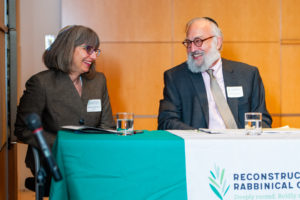
The Center for Jewish Ethics at the Reconstructionist Rabbinical College in Wyncote is developing an initiative to explore the roles of race and racism in American Jewish experiences after receiving a grant from the National Endowment for the Humanities.
The tentatively titled “Race, Religion and American Judaism: Cross-Disciplinary Research, Public Scholarship and Curriculum Development” will support scholarship around the country on race and racism in American Jewry and create a curriculum and online course based on the research that can be shared with members of the Jewish community. The grant money will be used, in part, to hire a program coordinator to spearhead the initiative’s programming.
The one-year $199,500 grant is part of NEH’s American Rescue Plan, an $87.8 million grant program to assist 300 cultural institutions in maintaining or expanding programming and staffing that may have been impacted by the pandemic.
“This funding will allow us to encourage research and scholarship that might not otherwise have been able to happen,” Center for Jewish Ethics Director Rabbi Mira Wasserman said. “A lot of scholars in the humanities are really squeezed for resources, and so this is a small way that we can help.”
The initiative was inspired by a 2021 lecture series the center conducted in partnership with the Herbert D. Katz Center for Advanced Judaic Studies at the University of Pennsylvania. The series, “Jews, Race, and Religion,” consisted of 11 lectures from scholars, including “Is the Talmud Racist?” with Wasserman and “Black Power, Jewish Politics: Reinventing The Alliance in the 1960s” with San Francisco State University Jewish Studies and Social Responsibility Chair and Professor Marc Dollinger.
“The impetus for this series came out of the awakening that was happening throughout American society in the wake of the murder of George Floyd,” Wasserman said. “And it was happening, as we know, for Jews as well.”
Believing that all ethical issues, racism included, should be looked at through a Jewish lens, Wasserman thought a Jewish perspective on race and racism could help further illuminate the impact of racism on American society and that tackling the issues was a Jewish responsibility.
“Jewish life has always been multiracial, multicultural,” Wasserman said. “Broadening the view of what Jewishness is now, in what can be, is something that these scholars helped us do.”
The Center for Jewish Ethics will recruit 10 scholars at the beginning of 2022 who are finishing degrees or who “would otherwise have support for their research,” Wasserman said.
Amanda Mbuvi, RRC vice president for academic affairs, said the study of race and racism in the Jewish context could create “the momentum behind galvanizing this as a field of study and as a basis for action.”

“I’ve been in contexts before where I’ve been asked to choose from a menu of my academic expertise, and there wasn’t even an option to indicate Judaism and race,” Mbuvi said. “That wasn’t within the field of Jewish studies.”
With a team of 10 scholars exploring four disciplines within the subject of race and racism in American Jewry, the center intends to start a “cross-disciplinary” discussion in synagogues, religious schools and Jewish summer camps that aren’t just about recognizing diversity in the Jewish community.
“There’s a reckoning and an attentiveness … that creates space for people to be more nimble in — not just tolerating people or having a better analytical perspective on social issues — but in really recognizing diverse humanity,” Mbuvi said.
As a Bible scholar, Mbuvi sees the importance of evolving Jewish identity as central in the book of Genesis: There are 11 chapters before God’s call to Avram, asking him to go forth and create the nation of Israel, she said.
“It emphasizes identity as something that’s a work in progress,” Mbuvi said.
Wasserman believes similarly that the value of Jewish teachings is what guides the forthcoming initiative.
“The pursuit of knowledge is a Jewish value, and a piece of that is the pursuit of truth, but there’s also a strong Jewish tradition committed to the pursuit of justice,” Wasserman said. “And when it comes to the problem of racism, it’s hard to understand how to pursue justice if we don’t get a good grip on exactly what the injustice is, so we need to understand the problem.”
The Jewish Center for Ethics was established in 1994 as a means “to help people and communities address the diverse ethical challenges of contemporary life,” according to the RRC website.
[email protected]; 215-832-0741






